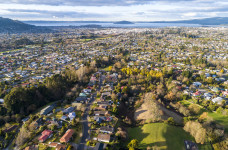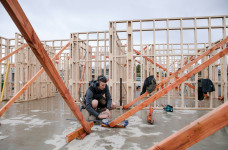Government Policy Statement on Housing and Urban Development (GPS-HUD)
Last updated: 21 November 2025 The Government Policy Statement on Housing and Urban Development (GPS-HUD) sets a direction for housing and urban development in Aotearoa New Zealand.
The vision
The GPS-HUD’s vision is that everyone in New Zealand lives in a home and a community that meets their needs and aspirations.
The four main outcomes it sets out to achieve are:
An adaptive and responsive system
Housing and urban development systems that are integrated, self-adjusting and deliver in response to social, environmental and economic change.
Land use and infrastructure are well-planned and coordinated. They support development and construction that can respond to demand.
Place-based investment, with central and local government working with partners and communities to identify and deliver the best mix of public and private initiatives and services.
Decision-making supported by robust and accessible data and evidence, including stakeholder and community insights.
Stable, affordable, healthy homes
Housing, whether it’s rented or owned, is affordable and provides stability of tenure.
People have choices about where they live and what type of home they live in.
People have enough money left over after housing costs for other things they need.
The quality, accessibility, size and features of homes support people and families to have healthy, safe, productive and fulfilling lives.
People in greatest housing need get the support they need, and homelessness is rare, brief and non-recurring.
Māori-led housing
Māori and the Crown work together in genuine partnership through the MAIHI approach so all whānau have stable, affordable, healthy homes.
Māori lead local delivery of housing solutions and can utilise their own assets and whenua.
Māori participate actively in the system through partnership with the Crown to invest in, lead and support housing solutions.
Thriving and resilient communities
Development is aimed at creating towns and cities that have abundant housing and well-functioning physical and community infrastructure.
People can get to employment and services quickly and efficiently.
Communities drive economic growth and support businesses to grow.
Existing housing stock and infrastructure are well managed and maintained.
Towns and cities are resilient to natural hazards, help reduce emissions and adapt to the impacts of a changing climate.
The natural environment of towns and cities is protected, maintained, and supports human health.
How we're going to achieve it
The Government has five key priorities intended to set us on the road to achieving the outcomes:
- Going for Housing Growth – getting the fundamentals right to target the underlying causes of the housing shortage and putting the right conditions in place to increase the supply of appropriate land for housing.
- Reforming the resource management system – removing red tape and green-lighting infrastructure and housing development.
- Resetting investment to help those most in need – taking a deliberate, evidence-based approach to housing investment that will make the biggest difference for people in need.
- Improving efficiency and competition in building and construction – making it cheaper and easier to build.
- Improving rental markets – incentivising investors to increase the supply of rental housing.
Māori-led housing – the MAIHI approach
MAIHI was developed in partnership with Māori, for Māori and is incorporated in the GPS-HUD.
For MAIHI to succeed, government agencies must work with each other and with Māori in genuine partnership over the next 30 years towards a shared vision that all whānau have safe, healthy, affordable homes with secure tenure, across the Māori housing continuum.
Poor housing outcomes for Māori are not new but have been exacerbated by broader housing affordability issues across the whole system. While there has been progress in increasing by Māori for Māori housing supply and building capability in the Māori housing sector, the scale is small, and there are still systemic and legislative barriers to achieving better outcomes for Māori housing.
The six MAIHI priorities support action to address these issues and are now part of the GPS-HUD.
Māori Crown partnerships
A strong Māori Crown partnership is critical to successfully strengthening housing solutions for whānau.
Māori-led local solutions
A focus on Māori-led local solutions aligns with the government’s place-based approach, enabling Māori and the Crown to better identify housing need at a local level and deliver fit-for-purpose housing solutions that take a “by Māori, for Māori” approach.
Māori housing supply
Building more houses is the main part of the solution, but we also need the right mix of housing that suits the needs of different whānau. This includes affordable rentals, options for those ready to buy their own home, and helping people return to their own whenua and live with their whānau in papakāinga.
Māori housing support
A warm, dry home is important for the physical and mental health of whānau. The housing support system needs to be easy to navigate for whānau to access these benefits.
Māori housing system
There is a need to address fragmentation and complexity in the housing system, and legislative barriers that stand in the way of Māori being able to use their own assets to provide better housing solutions.
Māori housing sustainability
This involves supporting whanau to sustain a connection to their land and look at ways to make housing solutions sustainable, innovative and responsive to the effects of climate change.



